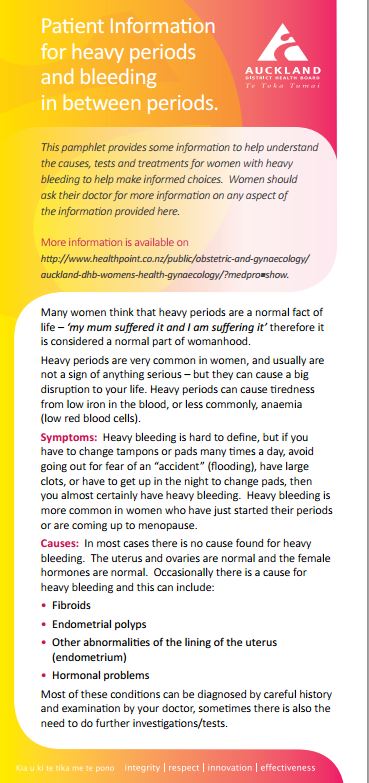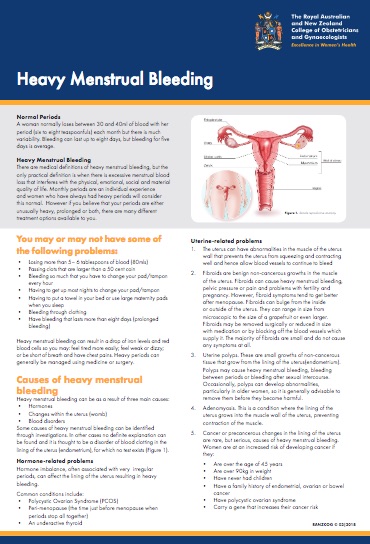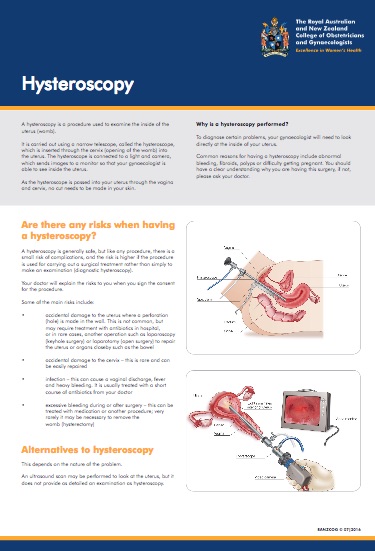You can now add Healthify as a preferred source on Google. Click here to see us when you search Google.
Medicines for heavy periods
Key points about medicines for heavy periods
- Medicines are one of the treatments used for heavy periods. A number of factors are considered when working out the best option for you.
- Heavy periods don't always need to be treated. But there are treatments that can help if they’re affecting your daily life.
- Find out how to take medicines for heavy periods safely and possible side effects.

A number of medicines can help to reduce heavy periods.
- Some use hormone therapy, eg, progestogen only (Mirena IUD, Depo Provera injection, Provera or Primolut N tablets) or oestrogen and progestogen (the combined oral contraceptive pill).
- Other options don't include hormones, eg, NSAIDs and tranexamic acid.
- Sometimes the bleeding may be better controlled by a combination of different medicines because they work differently.
Many factors are considered when working out the best medicine for you. These include your age, the severity of bleeding, other medical conditions you may have and the side effects of the medicine. Other factors to consider are:
- Some of the medicines are only used during your period and others are used every day.
- Your preference for tablets, an IUD (which is inserted) or an injection.
- Contraceptive (preventing pregnancy) versus non contraceptive options.
Mirena IUD
The Mirena intra-uterine device (IUD) is a small plastic device that is inserted into your vagina and placed in your womb (uterus). It slowly releases a small amount of the progestogen hormone (as levonorgestrel) directly onto the lining of your womb. This makes the lining of your womb thinner, making you less likely to have menstrual bleeding and reducing heavy periods.
- It can reduce menstrual (period) bleeding by up to 90%.
- Once fitted, the Mirena lasts for up to 5 years. However, it can cause irregular bleeding when first inserted.
- It needs a prescription and is inserted by a trained health professional (a doctor or nurse).
- It's a contraceptive.
Read more about Mirena IUD for heavy periods.
Tranexamic acid
Tranexamic acid are tablets that work by reducing the breakdown of blood clots in your womb.
- It can reduce the heaviness of period bleeding by almost half (40–50%).
- Tablets are taken for 3 to 5 days during each period.
- It needs a prescription.
- It's not a contraceptive.
Read more about tranexamic acid.
Non-steroidal anti-inflammatory drugs (NSAIDs)
Examples of NSAIDs include Ponstan and ibuprofen. They come as capsules or tablets.
- NSAIDs can reduce period bleeding by 20–50%.
- They also reduce period pain.
- They work best if you start taking them on the day before your period starts (if you can, or as soon as it starts) and continue over the heavy days. You need to take them every 6 to 8 hours.
- They don’t always need a prescription; you can buy ibuprofen from a supermarket or pharmacy and Ponstan from a pharmacy (chemist).
- It's not a contraceptive.
- Common side effects include indigestion and diarrhoea (runny poos).
Read more about NSAIDs.
Combined oral contraceptive pill (COC)
The combined oral contraceptive pill, known as ‘the pill’, contains the hormones oestrogen and progestogen.
- It reduces period bleeding by almost a third (30%) in some women.
- It also reduces period pain.
- You can skip some periods altogether depending on how you take the pill.
- You need a prescription.
- It's contraceptive.
Read more about the combined oral contraceptive pill.
Depo Provera injection
Depo Provera is an injection given every 13 weeks (approximately every 3 months). It's helpful for treating heavy periods; most women don't have any period bleeding after a few months, but some women can have irregular bleeding as a side effect.
- It needs a prescription and will be given to you by your doctor or nurse.
- It's a contraceptive.
Read more about Depo Provera.
Provera or Primolut N tablets
These tablets work by preventing the lining in your womb (uterus) from growing quickly. They belong to a group of medicines called progestogens.
- They're taken during your period.
- They need a prescription.
- They're a type of hormone therapy but not a contraceptive.
Read more about Provera tablets and Primolut N.
Heavy menstrual bleeding(external link) The Royal Australian and New Zealand College of Obstetricians and Gynaecologists
Brochures

Auckland DHB, NZ, 2014

RANZCOG, 2017

RANZCOG, 2016
Credits: Sandra Ponen, Pharmacist, Healthify He Puna Waiora. Healthify is brought to you by Health Navigator Charitable Trust.
Reviewed by: Angela Lambie, Pharmacist, Auckland
Last reviewed:
Page last updated:





